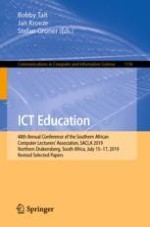2020 | OriginalPaper | Buchkapitel
Decoding Source Code Comprehension: Bottlenecks Experienced by Senior Computer Science Students
verfasst von : Pakiso J. Khomokhoana, Liezel Nel
Erschienen in: ICT Education
Aktivieren Sie unsere intelligente Suche, um passende Fachinhalte oder Patente zu finden.
Wählen Sie Textabschnitte aus um mit Künstlicher Intelligenz passenden Patente zu finden. powered by
Markieren Sie Textabschnitte, um KI-gestützt weitere passende Inhalte zu finden. powered by
